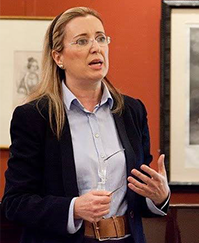Nicoletta Giantsi graduated from the School of Philosophy of the Aristotle University of Thessaloniki, wherefrom she also received her PhD in collaboration with the École des hautes études en sciences sociales, (EHESS), where she continued to collaborate as a visiting associate in the seminars of André Guillou and Eleni Antoniadis-Bibikou. She participated for many years in conducting the seminars of Settimana Spoleto, Centro Italiano di Studi sull´alto Medioevo with a scholarship of the same institution. She taught for five years in the Department of History-Archaeology-Social Anthropology as well as in the Department of Economic Studies of the University of Thessaly. She has taught at the University of Sorbonne IV and Paris X Ouest-Nanterre La Défense in Paris and participated in conducting the Greek-French postgraduate seminar (Master II) of the School of Law of the NKUA. She has done research in Brussels [(archives of the Center Public d´Aide Sociale (CPAS), Archives Générales du Royaume et Archives de l´État dans les Provinces (Algemeen Rijksarchief en Rijksarchief in de Provinciën), the Royal Library of Belgium, the Université Libre de Bruxelles (ULB)], Paris, Cambridge and Oxford.
Monographs
• "Commercial activity between the West and the East during the early Middle Ages", PhD thesis, Thessaloniki 1993.
• Women's Marginal Movements in Europe of the Late Middle Ages: The Beguines Movement, Thessaloniki 2001.
• The poor between the Church and the City: Urban charity in Western Europe during the Middle Ages", Athens 2011.
• The Imaginary Enemy: The Lepers of the Late Middle Ages and their Nursing Institutions. Rules and regulations of daily life in French leprosariums (12th-14th centuries), Athens 2020.
• History of the urban phenomenon: the emergence of the cities of Flanders during the Middle Ages, Athens 2022.
Main research interests: a) the economy and trade from the early Middle Ages to the last centuries (4th - 16th centuries), b) the composition and presence of the considered "marginal part" of urban populations (women, poors, helplesses), c) the urban phenomenon regarding the relationship that medieval cities developed both with their neighboring countryside and with phenomena of their administrative and legal development and d) The historiographical tendencies in the study of the economy and the urban phenomenon.

